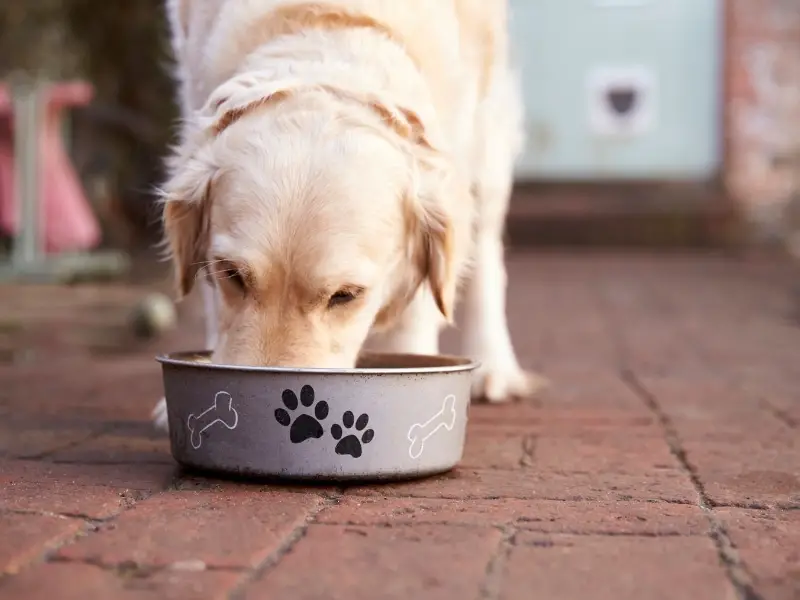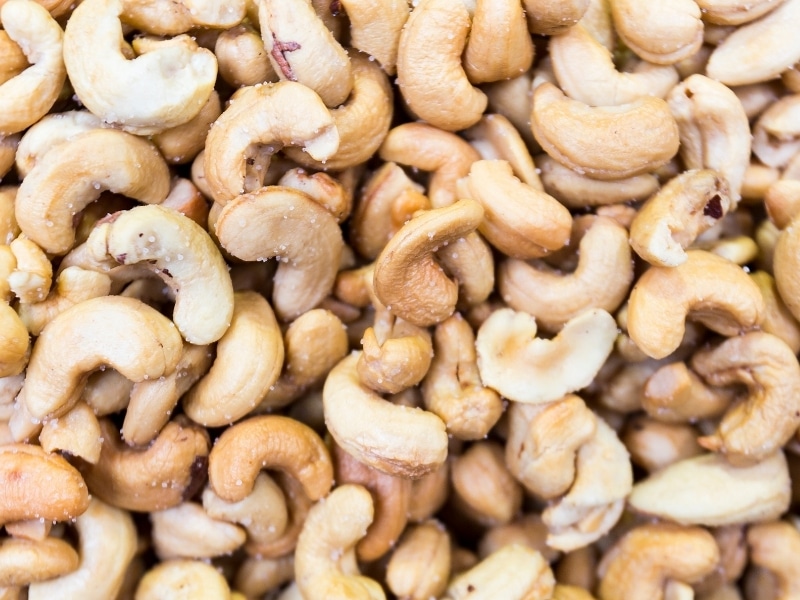Creamy and delicious cashews can be a healthy and protein-packed snack for people when consumed moderately. If you like sharing foods with your pooch, you’re probably wondering whether cashews are healthy and safe for dogs too.
So, can dogs eat cashews? Yes, dogs can eat cashews once in a while. Unlike macadamia nuts, cashews aren’t toxic to dogs, and shouldn’t harm your pooch in any way. While they are safe as a treat, cashews are high in fat and can contribute to weight gain. To avoid problems only feed plain, unsalted nuts to your dog.
In this article, we’ll explore all the pros and cons of feeding cashews to your dog. Continue reading to learn everything you need to know!
Are Cashews Good for Dogs?
When fed in a small amount, cashews are perfectly safe for dogs to eat and can be a great high-value snack.
These tasty nuts are a good source of protein, fiber, and healthy fats that can be beneficial for your dog’s overall health. Cashews are also chock full of vitamin B6 and minerals, including magnesium, iron, potassium, and calcium.
To take full advantage of all the good things cashews have to offer, feed them sparingly to your pooch. Please note, the high-fat levels found in cashews can be problematic for overweight dogs, so if your pooch has to shed some pounds don’t let them eat cashew nuts.
Benefits of Cashews for Dogs

When offered in moderation cashews are good for dogs and can even offer certain health benefits. The biggest benefits of feeding cashews to your dog are:
1. Cashews Promote Brain Function
Cashews are chock full of vitamin B6, which is involved in many functions inside your dog’s body and offers huge benefits to their overall health. Besides promoting healthy brain function, vitamin B6 also promotes growth and development in puppies, maintains heart health, and is involved in the production of red blood cells (source).
2. Support Good Digestion
Cashews are also an excellent source of dietary fiber which is necessary for proper digestion and nutrient absorption. The extra fiber from these nuts can regulate your dog’s bowel movement and also help in mild cases of constipation and diarrhea.
3. Cashews Build Strong Muscles
Chock full of protein, cashews can keep your dog energized throughout the day and also help increase their muscle mass. When combined with complete and balanced food, cashews can be an ideal protein-packed snack for active and working dogs.
4. Cashews Promote Bone Health
Cashews are a good source of magnesium, potassium, and calcium, all of which support strong bones and musculoskeletal health. Eating foods that are rich in these minerals can reduce the risk of bone fractures and sprains in dogs.
Risks of Cashews for Dogs

When fed sparingly, cashews aren’t dangerous for dogs, but eating these nuts isn’t completely risk-free for your pooch. The downsides of feeding cashews to dogs are:
1. High-Fat Content
All nuts are high in fat, and cashews are no different. A few cashews once in a while won’t put your dog’s health at risk, but eating a large amount at once can be extremely dangerous.
In the long term, high-fat diets lead to weight gain which can put your dog at risk of developing obesity-related health problems, such as diabetes and joint issues.
Furthermore, eating a large number of cashews at once can cause pancreatitis, a potentially life-threatening condition for dogs (source).
2. Allergic Reaction
Whenever you start feeding any new food to your dog, there is a risk of an allergic reaction. Nuts are a common allergen for both dogs and people, so you should observe your pup very carefully if they never ate cashews before.
If your dog exhibits any symptoms of an allergic reaction including swelling, itching, and hives stop feeding them cashews and call your vet right away. While an allergic reaction to cashews rarely happens in dogs, you should still be careful when feeding nuts to your pooch.
3. Choking Hazard
All dog owners should know that nuts pose a choking hazard to dogs, and there is also an additional risk of intestinal obstruction. Due to their size, shape, and hard texture, cashews can easily get lodged inside your dog’s throat, thus restricting their airflow.
Small dog breeds are especially at risk of choking and obstructions, but large dogs can suffer the same fate if they come across a larger nut.
4. Salt Toxicity
Cashews are usually sold salted and sometimes they come with additional flavors on them. Unfortunately, dogs can’t handle excess sodium, and eating salted cashews can lead to salt toxicity which causes vomiting and diarrhea, muscle tremors, and seizures.
Excessive salt can also cause dehydration, so dogs should only at plain, unsalted cashews. If your pooch shows any of the symptoms of salt toxicity call your vet or take them to an emergency clinic (source).
How Many Cashews Can a Dog Eat?
Cashews, like any other human food, should make only up to 10 percent of your dog’s daily calorie intake. Due to their high fat count, dogs should eat cashews in small amounts and only once in a while.
Talk with your vet if you have trouble figuring out how many cashews should your dog eat. They will be able to tell you exactly how many nuts you should feed to your pooch based on their age, activity level, size, and general health.
How to Feed Cashews to Your Dog?
If you decide to include cashews in your dog’s diet, make sure to feed only unsalted raw or roasted cashews to your pooch. Also, because some other nuts are toxic to dogs, it’s important that you don’t feed cashews that come from a variety pack, since they can be contaminated.
Popular ways to feed cashews to dogs are:
- Offer your dog one cashew at a time as a treat
- Make homemade cashew butter instead of peanut butter
- Blend yogurt, bananas, and cashew butter and serve as a treat
Conclusion
Unlike some other nuts that are toxic to dogs, cashews are completely safe and can offer some health benefits when fed in small amounts. Full of vitamins, minerals, protein, and fiber, these tasty nuts can be a healthy treat for special occasions.
Don’t feed your dog large amounts of cashews since they can cause pancreatitis and lead to obesity. And if you decide to treat your dog with nuts, always choose plain and unsalted raw or roasted cashews.
Related Articles:


0 Comments